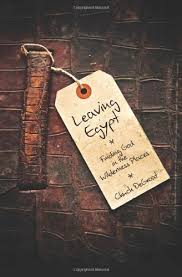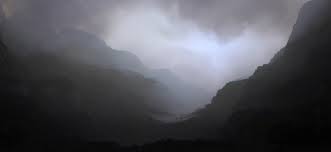 Today’s post is the second of 2 by Dr. Chuck DeGroat in his series Reformed and Contemplative: Discovering Both 16th Century Reformations. The first post is here.
Today’s post is the second of 2 by Dr. Chuck DeGroat in his series Reformed and Contemplative: Discovering Both 16th Century Reformations. The first post is here.
DeGroat is the author of Leaving Egypt: Finding God in the Wilderness Places, and co-founder and senior fellow at the Newbigin House of Studies, a partnership between City Church San Francisco (where he has served as a teaching pastor) and Western Theological Seminary (where he is Associate Professor of Pastoral Care and Counseling) . He has also served as a professor and Director of Spiritual Formation at Reformed Theological Seminary (Orlando). His forthcoming book is The Toughest People to Love (Eerdmans, Spring 2014).
*************************
In the previous post, I shared my experience studying with Prof. Alistair McGrath in Oxford, England during the  summer of 1997. McGrath was in a particularly self-reflective mood that summer, confessing that his own commitment to Reformed theology was enriched by his reading of contemplatives like Julian of Norwich, St. John of the Cross, Teresa of Avila, and the anonymous author of The Cloud of Unknowing
summer of 1997. McGrath was in a particularly self-reflective mood that summer, confessing that his own commitment to Reformed theology was enriched by his reading of contemplatives like Julian of Norwich, St. John of the Cross, Teresa of Avila, and the anonymous author of The Cloud of Unknowing.
As a 27-year old young Calvinist who’d understood one and only narrative about Catholics and Protestants during the Reformation, the revelation of McGrath’s love for the mystics jolted me, igniting my own love for these often ignored contemplatives.
I returned to Reformed Theological Seminary after that summer having passed muster, but sensing something much more profound at work within me. I’d exhausted myself to get the academic blessing of my professors, but something within whispered, “But you don’t know grace. Do you really know me?”
I knew much about God. I’d taught classes in high school on the Five Points of Calvinism and the Trinity. I had a degree in Philosophy from a Reformed College. But I’d missed Calvin’s own first words in his Institutes–“Nearly all the wisdom we possess, that is to say, true and sound wisdom, consists of two parts: the knowledge of God and of ourselves.”
I’d missed that last part – “of ourselves.” But McGrath reminded me as he reflected on his own marriage, his own story, his own anxious striving and his personal battle to know God, not just things about God.What I came to see was that there was not as much in my tradition about knowing God. My tradition is a heady tradition. And I’d discovered my own tendency to climb to God on the merits of my brain.
I was intrigued by concepts like “unknowing,” “mystical union,” and “the dark (obscure) night.” In fact, contemplative spirituality was initially attractive not as another thing to know about, but as a way of unknowing, unlearning, and finding rest. Yes, I needed to experience grace. And, I’ve found this idea resonating with the many Reformed seminary students I’ve taught over the past 15+ years.
My own journey took me to contemplative literature not only in the Catholic tradition, but allowed me to see it in Calvin’s doctrine of union, in the pastoral writings of Samuel Rutherford, or in Dutch Reformed writers I’d never heard of – Willem Teellinck, Theodorus à Brakel, Guiljelmus Saldenus, Wilhelmus à Brakel, and Herman Witsius.
 More so, I experienced a profound invitation to grace, if you can believe it, from Catholics like Henri Nouwen,
More so, I experienced a profound invitation to grace, if you can believe it, from Catholics like Henri Nouwen, Thomas Merton
, and Richard Rohr
–an invitation that has never once seemed to be contrary to my Reformed convictions, but always deepening and refining.
This has been a profoundly humbling journey. Calvin’s invitation to self-knowledge, in fact, is an invitation to humility. Contemplative spirituality, as I’ve understood it and practiced it, is not reading about rest but experiencing it, it’s not about preaching love but receiving it.
Though it can have the perception of being individualistic, inward, and anti-ecclesial, the contemplative life, in fact, is the Eucharistic life. It is living into that deep identity of being one who is Taken, Blessed, Broken, and Given – a reality experienced each Sunday (as Calvin intended it!) at table with God’s family.
It is a continual return from exile, a return Home, to one’s deepest center in God, made possible because God became one of us. It is a constant realization that our deepest life is “hidden in Christ,” as we die to ego, to pride, to our false selves, and put on that “new self” which is God’s very self in us.
The beauty not just of this realization, but of the experience of God as our deepest love, is what all of the Reformers longed for. Though their “protests” came in different voices, the invitation was voiced in unison – God longs for re-union with his beloved so that he can re-direct us into a life in which we proclaim his desire to renew us and renew all things.
And so, I am Reformed and Contemplative, grateful for these two movements of grace which continue to invite me to find myself in Him.
